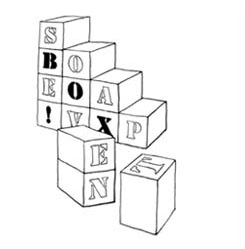This is an archive of the ArtCat Zine, 2007-2009. Please visit our new project, IDIOM.
NYUFF and Soapbox Event this weekend

New York Underground Film Festival
Various times
Wednesday 2 April - Tuesday 8 April 2008
Anthology Film Archives - 32 Second Ave, New York NY
Soapbox Event
2-5pm Saturday 5 April
Federal Hall National Memorial
This week marked the start of the 15th and final New York Underground Film Festival, which is restructuring this year into something other than its current, well loved and attended, annual festival form. Recommended this weeked in particular is The Only Possible City, a three part screening series organized by Mike Crane, Ryan Garrett and Edward Kihn, featuring theorist Manual De Landa's late 70s opus Raw Nerves: A Lacanian Thriller, Matthew Buckingham's rumination on an aborted proto-cinema history in False Future, and Harun Farocki's study of cinematographic representations of incarcerated bodies in Prison Images. Also recommended strongly is Orchard Gallery Presents, a double-bill screening organized by the eponymous downtown gallery that is also currently in its last year as an exhibition space. The program will screen Rock My Religion, Dan Graham's culture studies amalgam of Punk Rock and the Christian Diaspora, and Alain Resnais's Toute la Mémoire du Monde. Jim Finn will present The Juche Idea, a highly-stylized fictional portrait of a South Korean video artist inspired, while on a residency in North Korea, to adapt the "serious, thorough and sharp" critical language of revolutionary art to her own practice. The Phantom Menace will feature several short videos by James Fotopoulos and Mark Ther, among others. Where's the Love? is another program of shorts featuring recent video works by Michael Robinson, Drew Heitzler, and Peggy Ahwesh. Also strongly recommended is NYUFF's second TubeTime!, a kind of game show in which competitors trade found Internet media on the big screen to audience reactions.
On Saturday from 2-5pm at the Federal Hall National Memorial, artist Pia Lindman will present Soapbox Event, a public work in which people are invited to stand on provided soapbox structures and express themselves publicly for one minute — the boxes metaphorically ensuring freedom of expression (perhaps also implying that the speaker of unpopular opinions will now need an emphasized freedom to enunciate) and an assembled body of participant-spectators to receive the message. With these bare ground rules in place, participants are free to form coalitions with others and stack soapboxes to expand the time for free speech and produce longer orations.
ZINE
HOME
TIPS / COMMENTS
CATEGORIES
CONTRIBUTORS
- Greg Afinogenov
- B. Blagojevic
- Adda Birnir
- Susannah Edelbaum
- Julie Fishkin
- Paddy Johnson
- Jessica Loudis
- Christopher Reiger
- Andrew Robinson
- Peter J. Russo
- Blythe Sheldon
- S.C.Squibb
- Hrag Vartanian
